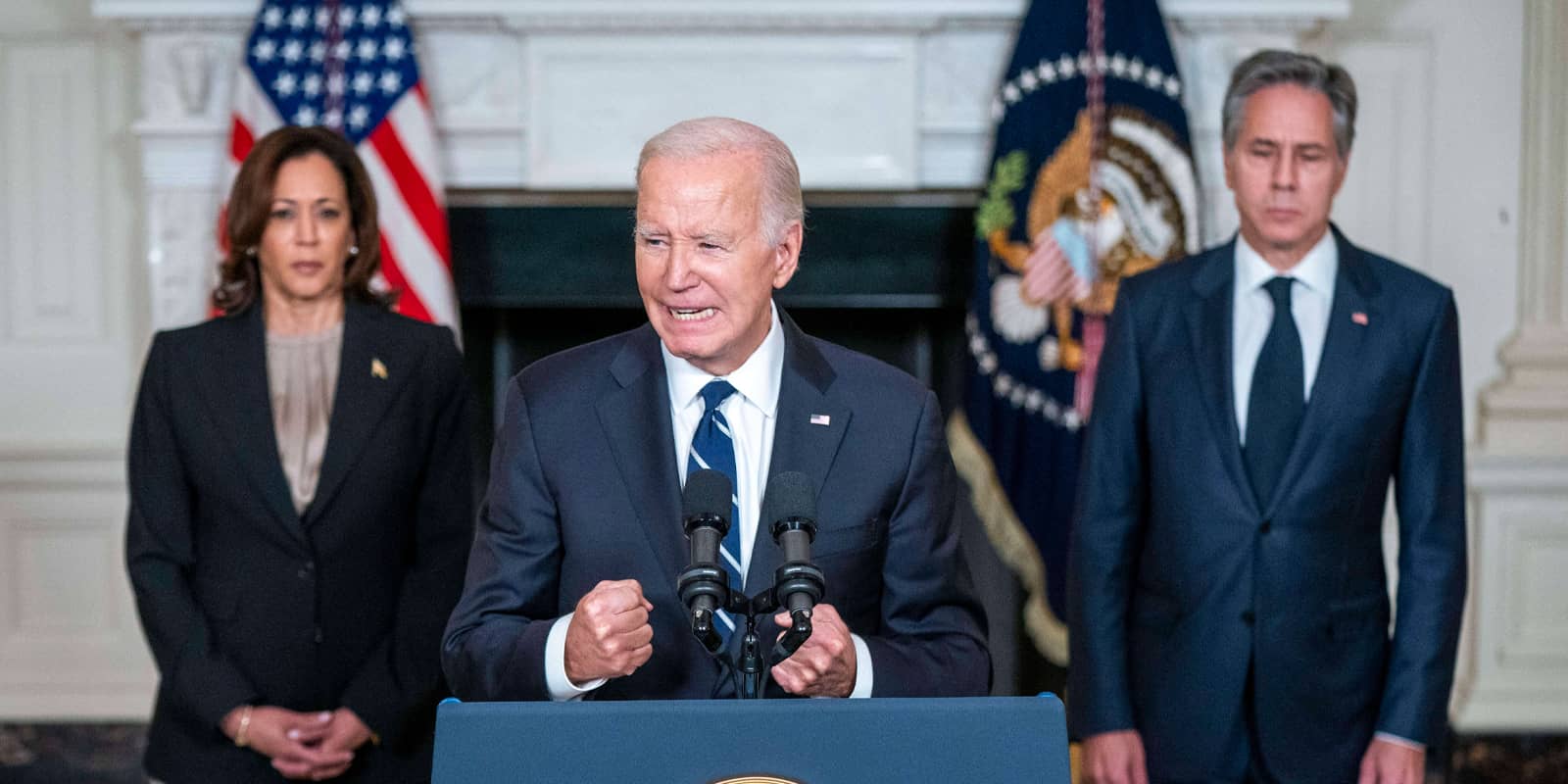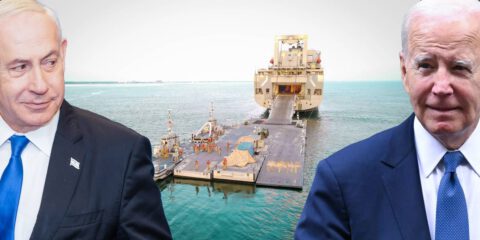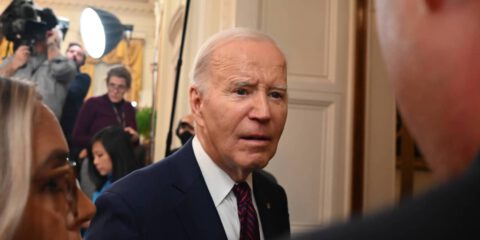The US strategic commitment to deter external intervention provides Israel with the time and space to act decisively to destroy Hamas without being constrained by threats from Iran and its proxies. At the same time, Israel should forcefully put on the table the question of Doha’s hospitality to Hamas leadership.
Ever since President Joe Biden’s initial statement (October 7, on the first day of the war), the United States and the West have been warning Israel’s other enemies not to take advantage of the situation: “The world is watching”. This was followed by a joint message by the leaders of the US, Britain, France, Germany, and Italy (October 9), another powerful and emotional speech by Biden (October 10), Secretary of State Anthony Blinken’s visit to Israel (October 12), Biden’s visit (October 18), and his address to the American nation (October 20) on aid to Israel (and Ukraine). The message – “Don’t” – was aimed at Hezbollah and Iran and reflects the realization that Iran’s fingerprints can be identified in the slaughter, even though the administration is still reluctant to point directly at Tehran.
Meanwhile, the American defense establishment has intensified its dialogue with its Israeli counterparts. The message of solidarity and the warning to Israel’s enemies have already been translated into action. Supplies have begun to arrive, and a massive supplemental budgetary request will be put to Congress when it becomes functional again. The carrier Gerald R. Ford and its task force sailed to the Eastern Mediterranean, to be joined by that of Eisenhower and the US Navy intercepted a missile attack from Yemen. In practice, all this means that Israel can, and indeed should, pursue action against Hamas aimed at its destruction, undeterred by both Iran and Hezbollah. Yet, at the same time, it must bear in mind that even such firm backing is ultimately conditional, and nor will it last forever. Hence the need to take into account American concerns about the humanitarian situation in the southern Gaza Strip, even as the IDF moves against the north.
In any case, if indeed – as Biden said – the results of this war matter for the security of the US and the world in the struggle against terror and in pursuit of regional and global stability, then the time has come, as Prime Minister Benjamin Netanyahu has already suggested, to use the new American commitment to end the Hamas leadership presence in Doha: while currently posing as a mediator on the hostage situation, Qatar can no longer host both the butchers and the largest US Air Force base in the region.
The American message and its background
Biden’s unequivocal stand in support of Israel, right from the first day of the war, and again in a meeting with American Jewish leaders, reflected not only a long-standing personal and political commitment but also a profound sense of shock, not only at the scope of the carnage but its nature too. The graphic images and descriptions have stirred up a profound reaction in Washington (as made evident by White House Spokesperson John Kirby’s tears), evoking there, as in Israel, the memories of the Holocaust and its lessons.
Within the first few days, Biden spoke four times with Netanyahu (who had a series of conversations with other Western leaders as well). He expressed in his public statements not only his outrage at the atrocities committed – which he compared with those of ISIS (Daesh), an organization the US sought to destroy altogether – but also an American strategic commitment to deter external intervention, a position of importance in the circumstances Israel is facing. All this was followed by Secretary of State Blinken’s statements in Israel, Biden’s own unprecedented visit to Israel during wartime, and his speech to the nation on aid to Israel and Ukraine. Throughout, the US administration emphasized a warning to enemy entities, whether “a government or an organization” – an obvious reference to Iran and Hezbollah later made explicit – not to use the unfolding tragedy as an opportunity to intervene against Israel. A similar text was woven into the statement of the five powers (October 9) in which the leaders of the US, Britain, France, Germany, and Italy pledged full support for Israel and her right to defend her citizens against such horrors and warned all hostile parties not to seek an advantage. The president directly referred on October 10 to the enhanced US military presence and bluntly used a simply-worded warning – “Don’t” – which, in terms of its implications, conveys an unprecedented threat of American intervention.
What led to this warning?
The intelligence picture that focused on Iran’s role in making possible specific aspects of the Hamas onslaught (albeit not necessarily in carrying it out) influenced the administration’s attitude. These suspicions are reflected in mainstream media coverage (e.g., The Washington Post), which reflects unattributed but official briefings. Confirmation of Iran’s support came even from overt statements by the Hamas spokesman.
However, the administration still resists assigning explicit blame to Tehran. It is wary of the accusation of its Republican critics, including Trump, that the arrangements made for the release of five Americans held in Iran – which involved unfreezing $6 billion in Iranian assets – served Iran in practice (albeit indirectly) to fund its proxy terror organizations, including Hamas. It did ask Qatar, which was expected to act as an intermediary in this transaction, to put it on hold once again. In any case, it cannot be ruled out that the administration still hopes – if Iran stays out of the war – to leave open the option of a return to the negotiating table on the nuclear question.
At the same time, Washington does suspect that Iran’s fingerprints can be identified as the motivation behind the attack. The administration looks upon it – as Blinken suggested – as designed to derail the normalization efforts between Israel and Saudi Arabia, which Biden considers an essential building block of America’s regional and global strategy. Foiling the normalization is a distinct Iranian goal, which may lead Hezbollah to intervene. That, too, plays a role in the administration’s decision to stand by Israel.
The evacuation of US citizens from the Gaza Strip will add to Israel’s room for maneuver. At the same time, experience teaches that this level of backing, and a time delay in taking action can be a wasted asset. At the beginning of the Second Lebanon War in 2006, all G-8 powers expressed in St. Petersburg their full support for Israel – but within weeks, when the leeway given to Israel was not effectively used, it began to dissipate. Hence the need to act decisively to destroy Hamas in Gaza City, on one hand, but also to take into account American concerns about the humanitarian situation that may evolve in the southern part of the Strip.
The Operational Dimension
The administration’s support of Israel quickly translated into an intense dialog between senior American officials and their Israeli counterparts, both civilian level (specifically, National Security advisers Tzachi Hanegbi and Jake Sullivan) and the military level: This includes close coordination with the new chairman of the Joint Chiefs of Staff, Gen. Charles Brown (who assumed command on October 1), and the CENTCOM commander, Gen. Michael Erik Kurilla, who built up a firm and close relationship with the IDF over the past two years.
Moreover, the visit of US Defense Secretary Lloyd Austin (himself a former CENTCOM commander) on October 13 – after the IDF had already called for the civilian evacuation of Gaza City and the entire northern part of the Gaza Strip – is a strong signal of support and coordination. So is the participation of President Biden himself in the War Cabinet discussion during his visit.
All this led to the immediate activation – after consultations in the Oval Office – of the protocols for the emergency supply of munitions and ordnance to Israel, which derive from previous strategic cooperation agreements (Israel, for its part, proved ready to draw munitions from the prepositioned stocks in Israel earlier this year so they could be supplied to Ukraine). As Biden mentioned, the specific items – which include interceptor missiles for the Iron Dome and the re-supply of air-to-ground munitions – will be determined over time by Israel’s emerging needs. No congressional approval is called for at this stage, but a supplemental budgetary resolution may eventually be necessary. In any case, streamlined relations with CENTCOM and the Defense Department made the implementation much smoother than in previous crises, and the first aircraft bearing supplies was up in the air on October 8.
The decision to deploy American deterrent forces to the region was significant, unprecedented, and somewhat jarring, as it raised questions over Israel’s traditional creed of military self-reliance. Based upon the president’s warning on the first day of the war, Austin made public (October 8) his instructions, which were designed to give weight to the president’s message (as well as express solidarity with Israel and its people):
- The world’s most modern aircraft carrier, USS Gerald R. Ford, and its CSG (Carrier Strike Group) – including the missile cruiser USS Normandy and four destroyers – has been sent to the Eastern Mediterranean in a significant show of force. The USS Eisenhower is now joining it.
- The American Air Force’s presence in the region is being augmented by F-35s, F-15s, and F-16s, as well as the A-10 Thunderbolt (for close air support, a thought-provoking indication of the scenarios the US military may be preparing).
- Further air and missile defense assets have been deployed to the region, as announced by Secretary of Defense Austin.
- Notably, the British Defense Ministry is deploying two Royal Navy support ships with hospital capabilities and surveillance aircraft in an act of solidarity with both Israel and the US.
As indicated in the IDF Spokesperson’s briefings, the US deployment is coordinated with Israel and is designed to generate a deterrent effect. That raises the question of how this may impact Israel’s vaunted Churchillian stance – “give us the tools, and we shall finish the work.” The sheer immensity of the challenge and the preference to avoid, at least for now, another deadly front in the North may be the subject of Trump’s mirth; still, they are of sufficient importance to the Israeli leadership at this stage for them to pay this price in pride and freedom of action.
Blinken – who made a point of mentioning that his stepfather was a Holocaust survivor – signaled his understanding of this dilemma when he spoke in Israel: “You may be strong enough on your own to defend yourself – but as long as America exists, you will never, ever have to. We will always be there by your side.”
Hezbollah has openly (and dismissively) referred to the American threat. Ibrahim al-Amin, editor of the Lebanese daily Al-Akhbar and well-known to be a Hezbollah propagandist, shot back a warning (October 10), quoting unidentified sources, that a US intervention would lead to all US facilities or assets in the region, military or civilian, being targeted. He claimed that Hezbollah could also strike the aircraft carriers. Despite the bravado, it is doubtful that Hezbollah or Iran are eager to test their abilities against the US, even if its image as a superpower has been diminished by the withdrawal from Afghanistan in 2021.
Congressional Positions
The support offered by the Biden administration is backed by almost wall to wall expressions of support for Israel. All one hundred Senators have made their position clear, and so have all but a few representatives. Even Rep. Ilhan Omar (D- Minn.), who consistently takes an anti-Israel and even antisemitic line, expressed shock at the Hamas atrocities (although she later walked it back). The need for supplemental budgetary legislation – which the administration has estimated at fourteen billion dollars, in itself an unprecedented sum – may even help hasten the appointment of a new House speaker so that it would be possible to move through legislation that the Republicans support almost unanimously.
Amidst this discussion, Sen. Lindsey Graham (R-Fla.), recognized as a leading authority in his party on foreign affairs and national security policy, made a remarkable suggestion. If Iran or a proxy would join the war, he proposed, its oil export facilities on Kharg Island should be destroyed, inflicting grave damage on the Iranian economy. The raising of such a far-reaching possibility indicates the mood in Washington.
Implications for Israel – and the need to put pressure on Qatar in Washington
The US tends to avoid empty threats, and thus, both its language and actions need to be taken seriously, even if there is still no guarantee that the president will order the use of force at the moment of decision. However, for the Israeli leadership, the significant message is that Washington and its partners in the West are willing to take a risk to reduce the threat of a multi-front war, which would impact the whole region.
Since Hezbollah’s hints about a red line may well refer to the ground incursion, the US willingness to try and deter them should be read as proof that the Biden administration, backed by bipartisan support in Congress, fully understands the need for Israel to pursue its campaign against Hamas according to its judgment as to the nature of the military action necessary. True, Biden and Blinken both added the caveat – “in accordance with the Laws of War,” but the term can be interpreted in a less restrictive fashion than the IDF and the IAF have been doing in past rounds with Hamas.
The US position can thus be read as leaving open the option of a significant ground campaign – specifically, in the northern part of the Strip, once enough time has been afforded for civilians to leave – without being overly constrained by threats from Iran and its proxies. Still, the warning that this is an asset that could be wasted over time needs to be kept in mind. The administration takes this position due to the intense reaction of Jews and non-Jews alike to the horrors perpetrated in the region around Gaza, but also due to the persistent importance of the war on terror for the US and the West, for moral and strategic reasons, and in the interest of sustaining regional stability.
Under these circumstances, the time has come – even while pursuing the war – for Israel to forcefully put on the table through various political and public channels the question of hospitality offered to Hamas leadership by Qatar.
Senior Hamas commanders have been monitoring the events from Doha. Qatari money has been flowing to Hamas’ areas of control in Gaza (with Israel’s permission!) – the Qatari Al-Jazeera network functions as a Hamas propaganda arm for all intents and purposes. America – which recently conferred on Qatar the title of “Major Non-NATO Ally” (MNNA) and has maintained for decades a large air base at Al Udeid – should posit an unequivocal demand for the removal of terror infrastructure and an end to incitement, above the present Qatari help on the hostage issue. The moral anger should be translated into diplomatic demands aimed at the ruling family in Doha. For much too long, they have enjoyed (with Israel’s tacit support) the ability to play a double game.
JISS Policy Papers are published through the generosity of the Greg Rosshandler Family.
Photo: IMAGO / ABACAPRESS








 - בניית אתרים
- בניית אתרים